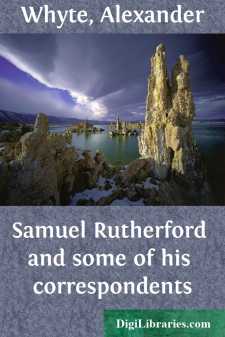Categories
- Antiques & Collectibles 13
- Architecture 36
- Art 48
- Bibles 22
- Biography & Autobiography 813
- Body, Mind & Spirit 142
- Business & Economics 28
- Children's Books 15
- Children's Fiction 12
- Computers 4
- Cooking 94
- Crafts & Hobbies 4
- Drama 346
- Education 46
- Family & Relationships 57
- Fiction 11829
- Games 19
- Gardening 17
- Health & Fitness 34
- History 1377
- House & Home 1
- Humor 147
- Juvenile Fiction 1873
- Juvenile Nonfiction 202
- Language Arts & Disciplines 88
- Law 16
- Literary Collections 686
- Literary Criticism 179
- Mathematics 13
- Medical 41
- Music 40
- Nature 179
- Non-Classifiable 1768
- Performing Arts 7
- Periodicals 1453
- Philosophy 64
- Photography 2
- Poetry 896
- Political Science 203
- Psychology 42
- Reference 154
- Religion 513
- Science 126
- Self-Help 84
- Social Science 81
- Sports & Recreation 34
- Study Aids 3
- Technology & Engineering 59
- Transportation 23
- Travel 463
- True Crime 29
Alexander Whyte
Alexander Whyte (1836-1921) was a prominent Scottish theologian and author, known for his profound sermons and extensive biographical studies on religious figures. He served as the minister of Free St. George's Church in Edinburgh and later as the principal of New College, Edinburgh. Whyte's notable works include "Bunyan Characters," a series of lectures on the characters in John Bunyan's "The Pilgrim's Progress," reflecting his deep interest in Christian literature and spirituality.
Author's Books:
Sort by:
by:
Alexander Whyte
INTRODUCTORY ‘The express image’ [Gr. ‘the character’].—Heb. 1. 3. The word ‘character’ occurs only once in the New Testament, and that is in the passage in the prologue of the Epistle to the Hebrews, where the original word is translated ‘express image’ in our version. Our Lord is the Express Image of the Invisible Father. No man hath seen God at any time. The only-begotten...
more...
by:
Alexander Whyte
IGNORANCE “I was alive without the law once.”—Paul. “I was now a brisk talker also myself in the matter of religion.”—Bunyan. This is a new kind of pilgrim. There are not many pilgrims like this bright brisk youth. A few more young gentlemen like this, and the pilgrimage way would positively soon become fashionable and popular, and be the thing to do. Had you met with this young...
more...
by:
Alexander Whyte
CHAPTER I—THE BOOK ‘—the book of the wars of the Lord.’—Moses. John Bunyan’s Holy War was first published in 1682, six years before its illustrious author’s death. Bunyan wrote this great book when he was still in all the fulness of his intellectual power and in all the ripeness of his spiritual experience. The Holy War is not the Pilgrim’s Progress—there is only one Pilgrim’s...
more...
by:
Alexander Whyte
Jacob Behmen Jacob Behmen, the greatest of the mystics, and the father of German philosophy, was all his life nothing better than a working shoemaker. He was born at Old Seidenberg, a village near Goerlitz in Silesia, in the year 1575, and he died at Goerlitz in the year 1624. Jacob Behmen has no biography. Jacob Behmen’s books are his best biography. While working with his hands, Jacob...
more...
by:
Alexander Whyte
I. JOSHUA REDIVIVUS ‘He sent me as a spy to see the land and to try the ford.’ Rutherford. Samuel Rutherford, the author of the seraphic Letters, was born in the south of Scotland in the year of our Lord 1600. Thomas Goodwin was born in England in the same year, Robert Leighton in 1611, Richard Baxter in 1615, John Owen in 1616, John Bunyan in 1628, and John Howe in 1630. A little...
more...
by:
Alexander Whyte
APPRECIATION AND INTRODUCTION The Religio Medici is a universally recognised English classic. And the Urn-Burial, the Christian Morals, and the Letter to a Friend are all quite worthy to take their stand beside the Religio Medici. Sir Thomas Browne made several other contributions to English literature besides these masterpieces; but it is on the Religio Medici, and on what Sir Thomas himself calls...
more...







